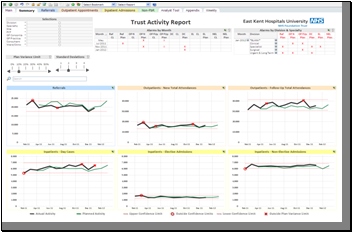In this article, BBH editor, Jo Makosinski, speaks to DR MARC FARR, deputy director of information at East Kent Hospitals University NHS Foundation Trust about the impact business intelligence software is having
The NHS is in the midst of a drive to become paperless, replacing tiresome and expensive paper processes with digital solutions that will help to speed up administration procedures, but also improve the overall experience for healthcare workers and patients.
We have to collect data and then we have got to manage that data better. A big thing for NHS trusts in the future will be linking these systems together so we get a much better picture of the entire care pathway
This drive is being helped through the adoption of high-tech solutions, including business intelligence software, which is helping NHS trusts to view processes and analyse patient data in real time and in a way that has never been done before.
East Kent Hospitals University NHS Foundation Trust is one of the forward-thinking organisations that is embracing this technology, having implemented QlikView from QlikTech.
The software has been rolled out across the entire trust, from junior nursing staff right to the chief executive – a total of 900 employees in total.
As well as providing them with the ability to view, process, and analyse patient data in real time, it enables clinical staff to critically judge reallocation needs. With the capability to harness data discerning who is working where, senior colleagues are now able to instantly reallocate resources depending on short-term need – a valuable asset in the health industry.
Speaking to BBH, Dr Farr said: “I can be at home and I can instantly see how many delayed transfers we have got or how many empty beds. When you think of a hotel, it seems obvious they would know this sort of information, but hospitals often do not, so you are running round trying to figure out where everyone is.
“By using business intelligence software, we get a real-time view of the whole hospital.”
The impact this has can be significant. If a particular GP has a lot of patients being admitted into hospital, then they can be challenged on this, or ambulatory or community care services can be improved.
“We have to collect data and then we have got to manage that data better. A big thing for NHS trusts in the future will be linking these systems together so we get a much better picture of the entire care pathway.”
At East Kent, Dr Farr is hoping to begin connecting the hospital systems with community services, GPs and even charitable organisations.
There is a lot of NHS bureaucracy to tackle and you will need to put together a business case, but it’s about convincing them of the long-term benefits to patients and to the way the hospital can run more efficiently
A key stumbling block towards this aim is that software from various providers often does not link together.
Dr Farr said: “The key to the future of joined-up health services is to untangle all the data that sits within big IT systems, like PACS. Some providers will make that easy to do that, but others will have all that data locked down and make it very difficult to get to that data more than once a day. Ours can do it several times in a minute and that is a huge bonus for us, and a challenge for other software providers.”
IT professionals also face problems convincing boards of the benefits of deploying solutions, he added.
“We wanted to do something new and you have got to convince people that it is something worth doing,” he said. “There is a lot of NHS bureaucracy to tackle and you will need to put together a business case, but it’s about convincing them of the long-term benefits to patients and to the way the hospital can run more efficiently.
“It has made a huge difference to operations at our trust and is certainly something we will be building upon in the future.”





